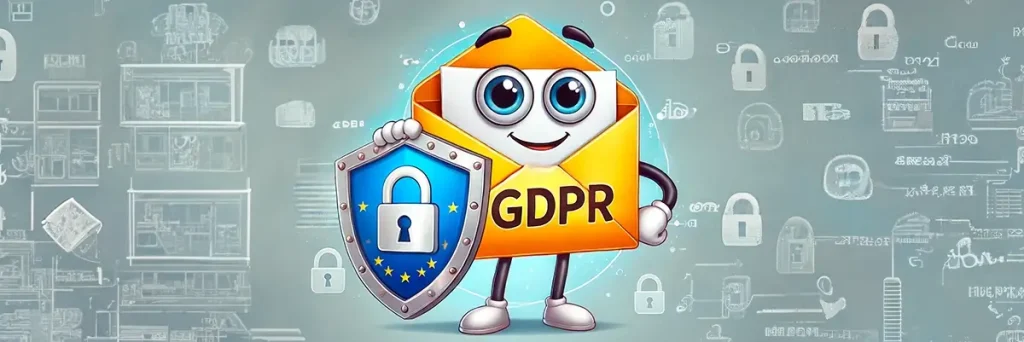The GDPR requires companies to take care of the quality of the data, which must be accurate, up-to-date and corrected or deleted if incorrect. Therefore, in addition to keeping e-mail data correct, e-mail verification companies must comply with this law and be jointly responsible for its security.
In this way, we can say that the GDPR has principles that make e-mail verification a more than important process, indispensable for maintaining companies’ compliance with this regulation, requiring commitment from all parties and attention to detail.
For more information on the relationship between e-mail marketing and GDPR, we’ve already covered the topic of GDPR and e-mail marketing in another blog post.
In this article, we will focus more on the relationship between the specific activity of e-mail verification in relation to what is required by the GDPR.
Table of contents
Is e-mail verification required by GDPR?
Not directly. However, there are guidelines and requirements from the GDPR which state that the controller (company holding the personal data) must meet strict principles of quality and accuracy of the data stored, as well as implementing measures to ensure that any inaccurate data is corrected or deleted, as described in Article 5(1)(d) of the GDPR.
In other words, this type of requirement implicitly implies the need to adopt practices such as regular e-mail verification and database cleansing, usually through a contracted platform such as SafetyMails.
In addition, the principle of data minimization (Article 5(1)(c)) states that data must be adequate, relevant and limited to what is necessary for the proposed processing purpose.
This means that companies should delete invalid, duplicate or irrelevant e-mails, as they may thereby be storing data for no legitimate purpose.
E-mail verification is data processing
E-mail verification is an activity that is governed by personal data protection laws, as the e-mail address itself is considered personal data capable of identifying a natural person.
Therefore, all activities involving the storage and processing of e-mail addresses must comply with the protection laws of the countries in which they operate, in order to guarantee the security and protection of this data.
Legal co-responsibility between companies
The GDPR clearly states that the Data Controller and the Data Processor are jointly responsible for the safekeeping and protection of personal data.
This situation of co-responsibility occurs when the Controller shares personal data with the Processor. From that moment on, the responsibility is mutual, i.e. both become obliged to protect the data and will be held responsible in the event of an incident or data leak.
The Data Controller (GDPR Article 4(7)) is the company or organization that holds the personal data of the Data Subjects (persons) and determines the purposes and means of processing this data.
The Data Processor (GDPR Article 4(7)) is the company that processes this data on behalf of the Controller, following its instructions. In other words, it can be a third-party company, such as an e-mail verification company.
Among the responsibilities shared between the Controller and the Processor are:
- ensuring that all data processing takes place in accordance with the GDPR.
- choosing processors that comply with the GDPR;
- implementing appropriate technical and organizational measures to ensure data security;
- keeping records of processing activities;
In other words, if an e-mail verification company (processor) fails to adequately protect data and a leak occurs, both the verification company and the client (controller) could be held liable, depending on the contract and the security measures adopted.
Hence the importance of choosing a serious company committed to data security and GDPR compliance.
Precautions when selecting a GDPR-compliant e-mail verification tool
The choice of an e-mail verification tool cannot be made at random, especially when there is a commitment to maintaining compliance with the GDPR. Any service that handles customer e-mails must comply with the requirements imposed by this law.
So here are some important guidelines you should follow when choosing your e-mail verification platform:
- Privacy and data protection policies: find out more about the data protection and privacy documents of the company that provides e-mail verification services. They should be public and easily accessible, cover all relevant topics and make clear the purposes of the service, use of data, retention time, among other aspects. In other words, the service should describe how it collects, stores and processes data;
- Compliance with data protection laws: find out if the company complies with the GDPR and, in addition, with other data protection laws, such as LGDP, CCPA, among many others (as you can see in this article).
- Existence of a DPO: investigate whether there is a Data Protection Officer and their contact channels for answering questions and demanding compliance and security information.
- Country where services are offered: where is the e-mail verification company you intend to use based? And where are its servers hosted? Are these countries considered to have an adequate level of data protection? Countries with adequate levels of protection, according to the GDPR, are those recognized by the European Commission for guaranteeing security and privacy standards similar to those of the European Union.
- Security measures adopted: Do these platforms adopt security measures against intrusion, login theft, data leaks, differentiated access, separate production and development environments, data anonymization in test environments, among others?
- Data retention period: if not immediately deleted, how long is the data you share with these platforms stored?
These are just some of the precautions you need to take when hiring an e-mail verification tool (or any other tool that processes personal data) on behalf of your company.
Conclusion
The GDPR obliges companies to maintain clean, up-to-date and accurate databases. Failure to comply with these guidelines can result in significant violations and fines. E-mail verification plays a key role in this process, as it prevents inaccurate data from being stored and processed, reducing risks and ensuring compliance with the regulation.
Selecting a GDPR-compliant e-mail verification tool is not just a question of functionality, but also of security, privacy and transparency. Companies that handle personal data should exercise extreme caution when choosing a provider, ensuring that it meets all legal and technical requirements to avoid regulatory risks and protect users’ privacy.
FAQ
Is e-mail verification mandatory under GDPR?
Not directly. However, the GDPR requires that the data stored be accurate, up-to-date and relevant for the purpose of processing (Article 5(1)(d)). This implies the need to regularly check the quality of stored e-mails, deleting invalid, duplicate or irrelevant ones.
Are e-mail verification companies (tools) considered data processors?
Yes! According to the GDPR, a company that checks e-mails processes personal data on behalf of another company (the controller). It is therefore considered a data processor and has legal responsibilities to ensure security, privacy and compliance with GDPR standards.
How do you ensure that an e-mail verification service complies with the GDPR?
To ensure compliance, it is necessary to analyze whether the company has at least a transparent Privacy Policy, a Data Processing Agreement (DPA), the location of servers in countries with an adequate level of security, security measures adopted against leakage and improper access, and whether the company allows requests for deletion and access to data.
Where should data be stored to comply with the GDPR?
Personal data must be stored in the European Union or in countries recognized by the European Commission as having an adequate level of protection. Otherwise, the company must adopt legal safeguards, such as Standard Contractual Clauses (SCCs), to ensure data protection
What happens if an e-mail verification tool doesn’t protect data properly?
If data is leaked or misused, both the controller (the company that has contracted the service) and the processor (the e-mail verification company) can be held legally responsible. This can result in heavy fines, operational restrictions and damage to the company’s reputation.



